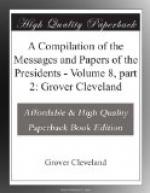Among the subjects which have heretofore occupied the earnest solicitude and attention of Congress is the management and disposal of that portion of the property of the nation which consists of the public lands. The acquisition of them, made at the expense of the whole Union, not only in treasure but in blood, marks a right of property in them equally extensive. By the report and statements from the General Land Office now communicated it appears that under the present Government of the United States a sum little short of $33,000,000 has been paid from the common Treasury for that portion of this property which has been purchased from France and Spain, and for the extinction of the aboriginal titles. The amount of lands acquired is near 260,000,000 acres, of which on the 1st of January, 1826, about 139,000,000 acres had been surveyed, and little more than 19,000,000 acres had been sold. The amount paid into the Treasury by the purchasers of the public lands sold is not yet equal to the sums paid for the whole, but leaves a small balance to be refunded. The proceeds of the sales of the lands have long been pledged to the creditors of the nation, a pledge from which we have reason to hope that they will in a very few years be redeemed.
The system upon which this great national interest has been managed was the result of long, anxious, and persevering deliberation. Matured and modified by the progress of our population and the lessons of experience, it has been hitherto eminently successful. More than nine-tenths of the lands still remain the common property of the Union, the appropriation and disposal of which are sacred trusts in the hands of Congress. Of the lands sold, a considerable part were conveyed under extended credits, which in the vicissitudes and fluctuations in the value of lands and of their produce became oppressively burdensome to the purchasers. It can never be the interest or the policy of the nation to wring from its own citizens the reasonable profits of their industry and enterprise by holding them to the rigorous import




